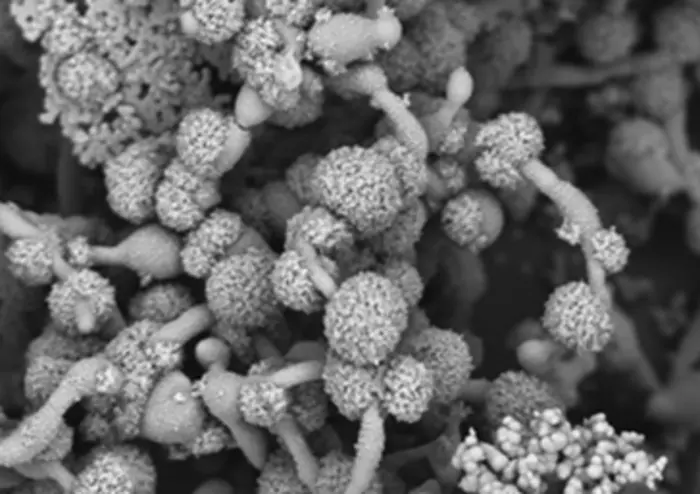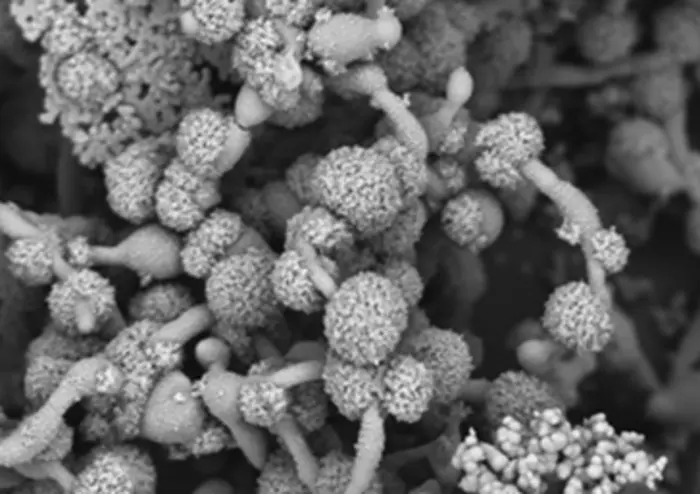Researchers working on solutions for antifungal resistance are being encouraged to apply to a new £3.4 million fund led by the University of Exeter with UK government funding.

Credit: Dr Alexandra Brand (University of Exeter MRC CMM)
Researchers working on solutions for antifungal resistance are being encouraged to apply to a new £3.4 million fund led by the University of Exeter with UK government funding.
The new fund, called FAILSAFE (Fungal AMR Innovations for LMICS: Solutions and Access For Everyone), is being launched by the University of Exeter’s MRC Centre for Medical Mycology, in partnership with the UK Department of Health and Social Care’s Global AMR Innovation Fund (GAMRIF).
Life-threatening fungal diseases take as many lives annually as TB or malaria, but the organisms that cause them are understudied, and the number of drugs available to treat them is worryingly limited. Considering this threat, increasing frequencies of antifungal drug resistance amongst fungi in the natural environment and in patients undergoing hospital treatment means even fewer drugs are effective. This is a major cause for global concern, and part of a wider global threat of antimicrobial resistance (AMR), which includes resistance to antibacterial drugs.
Antifungal drug resistance is a huge threat not only to human health, where some fungi are particularly deadly to people with compromised immune systems, including children with leukaemia, but also to global food security as resistant fungal pathogens can affect a broad range of species of animals and plants and therefore essential crops for the human food supply.
Solutions for antifungal drug resistance are urgently needed, and the new FAILSAFE project is aiming to address this issue. GAMRIF is a One Health UK Aid fund that supports research and development around the world to reduce the threat of antimicrobial resistance in humans, animals and the environment for the benefit of people in low- and middle-income countries.
GAMRIF is partnering with the University of Exeter’s MRC Centre for Medical Mycology (MRC CMM), as it currently represents more than 30 per cent of UK scientists working in medical mycology and is one of the largest medical mycology groupings worldwide. The Centre’s overarching mission is to deliver world-leading research that will substantially advance our understanding of fungal pathogenesis, host immunity and disease phenotypes, thereby enabling the generation and utilisation of skills and knowledge that will improve the prevention, diagnosis and treatment of fungal diseases in the future.
Professor Gordon Brown, of the University of Exeter, is principal investigator on the project. He said: “It’s wonderful to now have resources that will help to generate products and solutions that tackle antifungal drug resistance in low- and middle-income countries, which suffer the highest burdens of human fungal infections.”
Professor Elaine Bignell, Co-Director of Centre and FAILSAFE Co-Lead said: “Suppression of fungal diseases and drug resistance requires coordinated global research and development efforts. FAILSAFE will provide critical support for this and help to build a global network focusing on sustainable solutions and training, that will be developed and delivered in the many unique contexts in which fungal infections destroy lives.”
Professor Dame Sally Davies, UK Special Envoy for AMR, said: “Antifungal drug resistance is a pressing, understudied global threat for which urgent solutions must be sought. I am proud that the UK Government, through GAMRIF, is taking action and establishing FAILSAFE with the MRC CMM – a world-leading centre for fungal research. This global initiative will be vital to accelerate One Health fungal innovations and solutions in the fight against antimicrobial resistance.”
The FAILSAFE project will distribute its funds to innovative projects that deliver products or solutions for AFR, led by researchers from across the globe. Bids for this first round of available funds are currently welcomed, and prospective applicants are encouraged to find out more here before the July deadline. Project funds will support cutting-edge research and development that focuses on, the generation of products or solutions to mitigate the consequences of AFR, the development of innovative One Health solutions to tackle AFR, increased availability of context-specific, accessible and affordable innovations for low and middle-income countries, establishment of international research partnerships with industry, academia and governments, or to collaborate with and leverage additional funding from other global donors.
The FAILSAFE project is one of many initiatives led by the MRC CMM, of which Professor Brown is the Director. The MRC CMM is actively working to increase capacity in medical mycology, particularly in those parts of the world which suffer high burdens of fungal disease. To facilitate this, the Centre has developed a unit in Africa, with another unit launching later this year in South America. These international units facilitate collaboration with colleagues across the globe, tackling fungal diseases endemic to the geographical regions in which they are located and bringing together interdisciplinary research.
FAILSAFE aligns with government priorities and the G20 summit scheduled to take place later this year in Brazil, supporting global health systems and fighting high rates of infectious disease in low- and middle-income countries. Get in touch with the FAILSAFE team by emailing [email protected] and by visiting www.cmm-failsafe.com/contact/.





